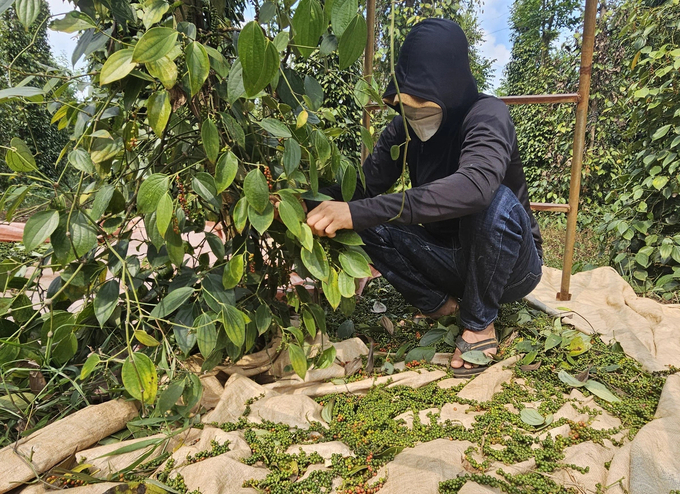(VAN) Pepper export turnover in the first 9 months increased by more than 46% compared to the same period in 2023. However, Asia – the largest export region of Vietnamese pepper, decreased by 33.7%.

Pepper prices are at a good level compared to previous years. Photo: N.TRI.
According to information from the Vietnam Pepper and Spice Association (VPSA), in the first nine months of 2024 (cumulative from January 1 to September 30), Vietnam exported 200,894 tons of pepper of all kinds, of which black pepper reached 177,953 tons and white pepper 22,941 tons.
Total export turnover reached USD 991.0 million, black pepper reached USD 781.9 million, and white pepper reached USD 142.1 million. Compared to the same period in 2023, the export volume decreased by 1.7%, but the value increased by 46.1%.
The substantial increase in export value is because the average export price of black pepper in the first nine months reached USD 4,85price ton, and the price of white pepper was USD 6,461 per ton, increasing by 40.9% and 30.4% respectively, compared to the same period last year.
According to VPSA, Asia is still the largest export region of Vietnamese pepper, accounting for 37.8%, reaching 75,859 tons.
However, the above level decreased by 33.7% compared to 2023, mainly from the Chinese market.
Specifically, some of the leading export markets in Asia, such as UAE: 13,159 tons, up 41.1%; India: 9,284 tons, up 0.5%; South Korea: 5,710 tons, up 59.0%; Pakistan: 4,992 tons, up 55.8%… China alone reached 8,905 tons, down 84.1%.
Exports to the Americas reached 62,634 tons, up 49.6%, of which the United States was the largest export market with 57,289 tons, accounting for 28.5% of the market share and up 53.1% over the previous year.
Exports to European markets also recorded a sharp increase of 33.6% to 50,769 tons. Germany led the way with 12,777 tons, up 87.1%; the Netherlands: 8,065 tons, up 35.4%… The African region accounted for 5.8% of the market share, reaching 11,632 tons.
According to businesses, with 3 months left for exports in 2024, the pepper industry will undoubtedly join the “billion dollar club,” possibly even reaching USD 1.3 – 1.4 billion if pepper prices increase well (the whole year of 2023 reached more than USD 912 million).
According to records, the price of pepper (dry black type) is currently commonly VND 152,000 – 158,000 per kg depending on the type (including zem), a slight decrease compared to more than a week ago, but more than double the same period in 2023.
Talking to Tuoi Tre Online on October 10, a representative of VPSA said that after reaching the mark of more than VND 200,000 per kg in previous months, pepper prices turned down and stayed around the mark of VND 150,000 – 160,000 per kg in recent times, mainly due to the impact of export activities, supply and demand, especially when many countries entered the harvest season.
“Pepper prices are still much better than in previous years, and many farmers have made high profits. However, short-term price increases and decreases may occur because this commodity is being affected by many factors”.
Many businesses say Vietnam accounts for nearly 50% of the global pepper supply. With the crop season lasting from February to April, prices may fluctuate at this time but are still forecast to be good because the primary supply is insufficient to meet demand.
Marcellus Giovanni, CEO of Brazspice Spices International, said that many companies and agents in Vietnam are currently selling black pepper. This is mainly to raise money to invest in the upcoming coffee crop while market demand remains low.
A report from Nedspice shows that Vietnam’s processed pepper exports have increased by more than 50% compared to last year. The shortage of Chinese suppliers has caused Vietnam’s whole black pepper exports to increase only slightly.
During the 7-day National Day holiday, China encouraged domestic consumption and tourism, reducing imports of goods, including pepper. Pepper prices also fell due to the strong US dollar amid conflicts in the Middle East, affecting global pepper prices.
The world economy is unstable, with high inflation, rising interest rates, and geopolitical conflicts, raising concerns about a global recession. Pepper importers have become cautious, reducing purchases to avoid risks and reducing demand and pepper prices. Due to weak demand, pepper prices have been falling continuously recently. Traditional markets in Vietnam have also imported large quantities of pepper and are not in a hurry to buy more, waiting for the market.
Agriculture News | Agri Products Price



